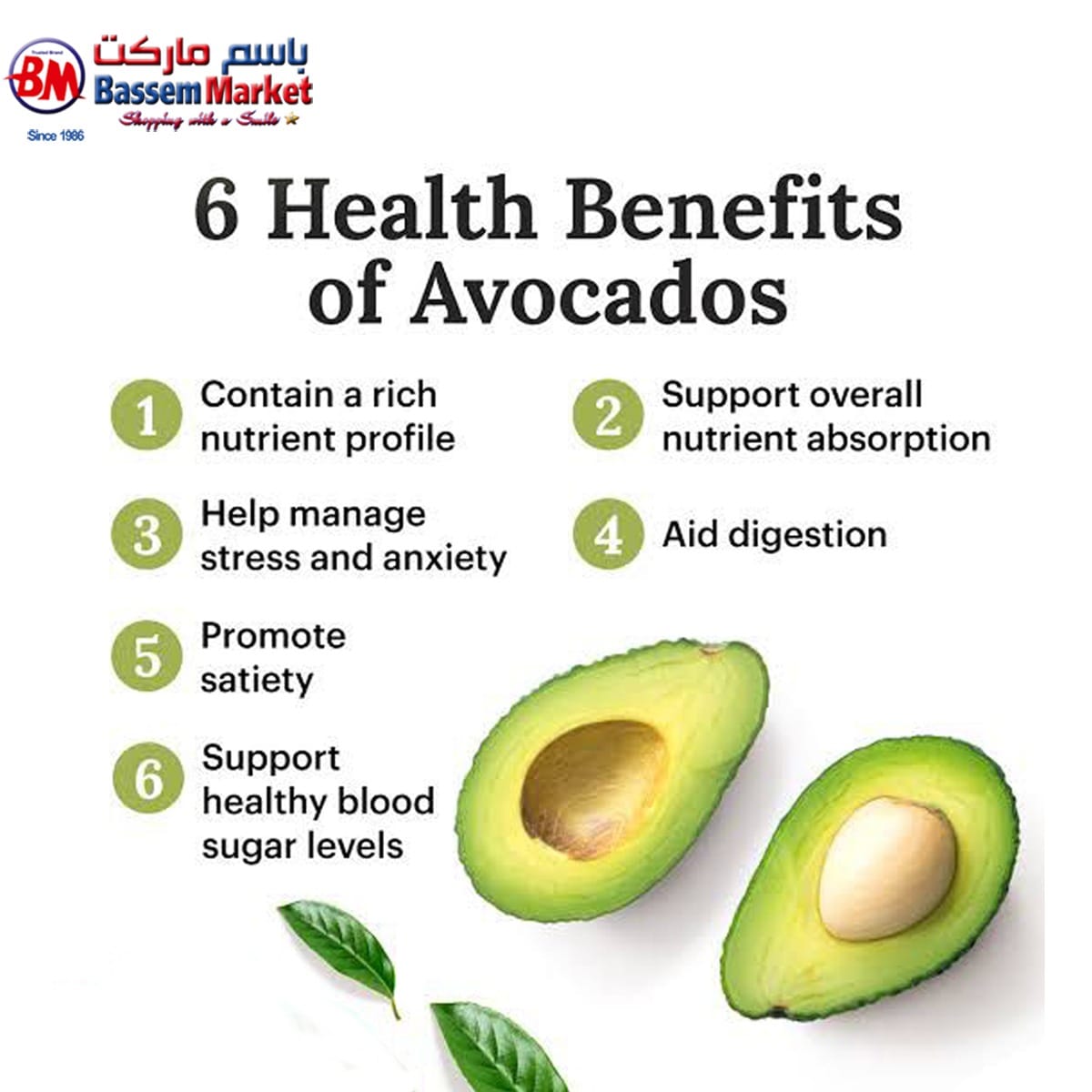
What Are Avocados?
-
Avocado (Persea americana), also known as butter fruit in some regions, is a fruit high in healthy fats and low in sugar.
-
Unlike many fruits, it is rich in monounsaturated fats, fiber, vitamins, minerals, and various bioactive compounds.
-
Common varieties include Hass, Fuerte, Reed, etc. The Hass variety is particularly popular due to its creamy texture and flavor.
Nutritional Profile: What’s in Avocados
Here are the key nutrients you’ll get from a medium avocado (about 150‑200 g) or from roughly half an avocado:
Health Benefits of Eating Avocados Regularly
-
Heart Health & Cholesterol Improvement
Monounsaturated fats (especially oleic acid) in avocados help reduce LDL (“bad”) cholesterol and increase HDL (“good”) cholesterol. Regular intake of avocado is associated with reduced risk of cardiovascular disease. Replacing saturated fats, butter, or processed foods with avocado yields better lipid profiles. -
Better Digestion & Gut Health
Thanks to the high fiber content, avocados promote regular bowel movements, help prevent constipation, and support healthy gut flora. Some studies show increased diversity of beneficial gut bacteria when avocados are part of the diet. -
Weight Management & Satiety
Although calorie‑dense, the healthy fats + fiber combination helps you feel full longer, reduces snacking, and controls appetite. Studies show people who include avocado in meals tend to eat fewer calories later. -
Eye Health
Avocados contain carotenoids such as lutein and zeaxanthin that are found in the eyes. These compounds protect the eyes from oxidative damage, help prevent age‑related macular degeneration and cataracts. -
Anti‑Inflammatory and Antioxidant Properties
Avocados offer antioxidants (vitamin C, E, phenolic compounds, carotenoids) and other bioactive molecules that help reduce oxidative stress and inflammation in the body. Chronic inflammation contributes to many diseases (heart disease, diabetes, etc.). -
Support During Pregnancy and Cell Growth
Nutrients like folate, potassium, vitamin K etc. are especially important during pregnancy. Folate helps in preventing neural tube defects. Also, healthy fats support fetal brain development. -
Metabolic Health & Blood Sugar Control
Fiber and healthy fats help slow digestion, avoid sudden blood sugar spikes. Including avocados in meals may improve insulin sensitivity and reduce risk of type 2 diabetes. -
Better Nutrient Absorption
The fats in avocados help absorb fat‑soluble vitamins (A, D, E, K) and antioxidants from other foods. For example, adding avocado to salads or vegetable dishes increases the absorption of carotenoids from those veggies.
Potential Risks, Precautions & Moderation
-
High Calorie / Fat Content
Since avocado is calorie‑dense, eating very large amounts without adjustment elsewhere may lead to weight gain. Moderation is key. -
Allergies
Some individuals may have avocado allergies (oral allergy syndrome, latex‑fruit syndrome). If allergic, avoid. -
Possible Drug Interactions
Avocados are high in vitamin K, which may interfere with blood thinners like warfarin. Always consult a healthcare provider if you are on such medications. -
Oxidation / Freshness
Once cut, avocado flesh oxidizes quickly (turns brown). To reduce waste, use fresh, or store with lemon juice / airtight containers.
Qualities That Make Avocados Unique
-
Creamy Texture & Rich Flavor
Its buttery, smooth flesh is satisfying, replaces less healthy fats (like butter, mayo) in cooking. -
Versatility in Use
Can be eaten raw (in salads, guacamole, toast), blended (smoothies), used as spread, incorporated into both savory and sweet dishes. -
Nutrient Density
You get a lot of essential nutrients in relatively small portions—vitamins, minerals, fiber, etc.—a true “nutrient-dense food”. -
Plant‑Based Healthy Fats
Avocado is one of the few fruits rich in monounsaturated fats comparable to olive oil. Beneficial for heart health. -
Low Sugar Content
Unlike many fruits, avocados are very low in sugar, which is favorable for blood sugar regulation.
Scientific Evidence & Studies
-
A study involving large US cohorts found that replacing certain saturated fat‑rich foods with avocado was associated with 16‑22% lower risk of cardiovascular disease.
-
Research shows that adding half an avocado to meals improves satiety and reduces total hunger / calorie intake later.
-
Regular avocado intake increases beneficial gut bacteria and reduces markers of intestinal inflammation.
Practical Tips: How to Add Avocados to Your Diet
-
Use half an avocado daily in salads, toast, smoothies, or as a spread.
-
Replace unhealthy fats (butter, mayo) with mashed avocado or avocado oil.
-
Combine avocados with colourful vegetables for more antioxidants.
-
For best nutrient retention, avoid over‑heating avocados—raw or lightly cooked works best.
-
Store cut avocados properly to avoid waste and oxidation.
SEO Keywords & Tags
To make this article Google‑friendly, here are some keywords & tag ideas:
Keywords:
-
Health benefits of avocado
-
Avocado nutrition facts
-
Avocado heart health
-
Avocado for digestion
-
Avocado weight management
-
Eating avocado daily
-
Avocado vitamins and minerals
-
Avocado eye health
Meta Description (Suggested):
“Discover the powerful health benefits of avocados—from heart protection and digestion support to eye health and vitamin boost. Why eating avocado regularly can elevate your diet.”
Tags:
-
#AvocadoBenefits #HealthyFats #Nutrition #HeartHealth #WeightManagement #GutHealth #EyeHealth #Superfood
Conclusion
Avocados are more than a trendy food—they are a nutritional powerhouse loaded with healthy fats, fiber, vitamins, minerals, and antioxidants. Regular consumption (in moderation) supports heart health, weight management, blood sugar control, eye health, digestion, and even pregnancy health. While avocados are calorie‑rich, their benefits often outweigh downsides for most people, so long as they’re part of a balanced diet.

You must be logged in to post a comment.